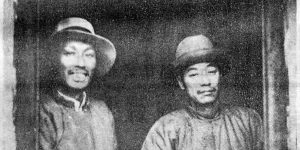Both the membership and the objectives of the CCP had undergone significant transformations since the 1921 founding congress. In 1927, the CCP was nearly wiped out by Chiang Kai-shek as a result of the policy of “United Front from within the KMT” imposed by the Communist International. While the expelled Trotskyist minority remained in the cities, most surviving CCP leaders fled the cities for the countryside, where they remained for the following two decades. Although the CCP had transformed from a revolutionary party of and for the urban working class into a peasant guerrilla movement, Mao Zedong continued to proclaim that the proletariat was the leader of the Chinese revolution and the CCP was the vanguard of the proletariat. The CCP’s prolonged exile in the countryside was legitimized as a strategic measure — to use the villages to surround and seize the cities — and this legitimization has remained the dominant revolutionary narrative in both Chinese and Western historiography. This transformation, dubbed the “Sinification of Marxism,” had been regarded by the Chinese Trotskyists, on the contrary, as a departure from Marxism and betrayal of the struggle for communism. The Trotskyists, led by CCP founder and former chairman Chen Duxiu and former Politburo member Peng Shuzhi, regarded themselves as the torchbearers and defenders of Chinese Marxism. An examination of the Trotskyist critique of the Maoist leadership of the CCP may serve to challenge the notion that Mao successfully applied Marxism to Chinese conditions. The Chinese Trotskyists were especially critical of the Maoist CCP’s attitude and actions towards the proletariat. The majority of Trotskyists rejected the CCP’s claim to represent the interests of the Chinese proletariat. Although, as its People’s Liberation Army approached the cities, the CCP appealed to and sought to recruit workers to the Party, their objective was to gain proletarian support for a coalition government with representatives of the bourgeoisie. The Trotskyists contended that the Maoists’ active dissuasion of class struggle and its appeals for capitalist support further confirmed that the CCP did not seek to champion workers’ interests. In particular, the Trotskyists pointed to the Maoists’ deliberate suppression of working class political action against the KMT regime as evidence that the Chinese Communist Party in 1949 had no intention of anointing the working class “masters of the country,” contrary to its claims. Rather, the CCP retained the self-appointed mantle of “proletarian vanguard” to lay claim to the role of representative of the working class while at the same time raising itself above the masses and ruling over them.
The Chinese Communist Party and the Proletariat in the 1949 Revolution

Maoist practice and Trotskyist critique of exclusion and suppression of urban working-class initiative in the overthrow of the Kuomintang and struggle against its landlord and capitalist supporters.